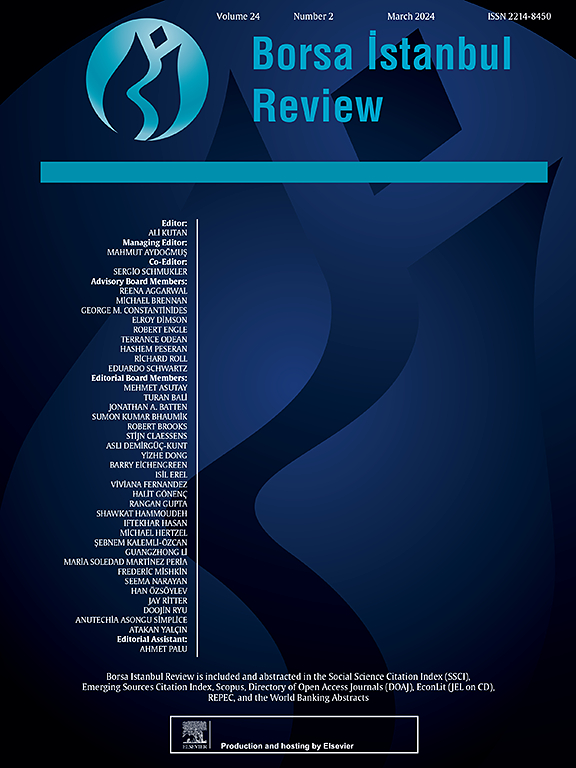Investor trends during periods of geopolitical risk in Türkiye: Which assets serve as safe havens?
IF 7.1
2区 经济学
Q1 BUSINESS, FINANCE
引用次数: 0
Abstract
This study investigates the safe-haven properties of different asset classes during periods of geopolitical risk in Türkiye and examines their comovement with the Geopolitical Risk Index. The research covers the period from January 2010 to January 2023 and employs wavelet coherence analysis and quantile-on-quantile regression methods. The findings reveal that geopolitical risk has varying long- and short-term effects on financial markets and housing prices. Additionally, our results show that the housing market can anticipate geopolitical risk fluctuations in the long run, and investors tend to shift to real estate during high-risk periods. Although gold acts as a safe haven in both the long and short run when geopolitical risk rises, oil prices respond in various ways in terms of direction and timing. Furthermore, fixed-income instruments are not perceived as safe-haven assets during periods of heightened geopolitical risk; instead, they tend to increase in parallel with perceptions of rising risk. The findings offer valuable insights into how investors formulate strategies during periods of uncertainty and have significant implications for policy makers and market participants.
地缘政治风险时期的投资者趋势:哪些资产可以作为避险资产?
本研究考察了日本地缘政治风险时期不同资产类别的避险属性,并考察了它们与地缘政治风险指数的变动。研究时间为2010年1月至2023年1月,采用小波相干分析和分位数对分位数回归方法。研究结果表明,地缘政治风险对金融市场和房价的长期和短期影响各不相同。此外,我们的研究结果表明,房地产市场可以预测长期地缘政治风险波动,投资者倾向于在高风险时期转向房地产。尽管在地缘政治风险上升时,黄金在长期和短期内都是安全的避风港,但油价在方向和时机方面的反应各不相同。此外,在地缘政治风险加剧期间,固定收益工具不被视为避险资产;相反,它们往往与风险上升的感知同步增加。这些发现为投资者如何在不确定时期制定策略提供了有价值的见解,并对政策制定者和市场参与者具有重要意义。
本文章由计算机程序翻译,如有差异,请以英文原文为准。
求助全文
约1分钟内获得全文
求助全文
来源期刊

Borsa Istanbul Review
Multiple-
CiteScore
7.60
自引率
3.80%
发文量
130
审稿时长
26 days
期刊介绍:
Peer Review under the responsibility of Borsa İstanbul Anonim Sirketi. Borsa İstanbul Review provides a scholarly platform for empirical financial studies including but not limited to financial markets and institutions, financial economics, investor behavior, financial centers and market structures, corporate finance, recent economic and financial trends. Micro and macro data applications and comparative studies are welcome. Country coverage includes advanced, emerging and developing economies. In particular, we would like to publish empirical papers with significant policy implications and encourage submissions in the following areas: Research Topics: • Investments and Portfolio Management • Behavioral Finance • Financial Markets and Institutions • Market Microstructure • Islamic Finance • Financial Risk Management • Valuation • Capital Markets Governance • Financial Regulations
 求助内容:
求助内容: 应助结果提醒方式:
应助结果提醒方式:


